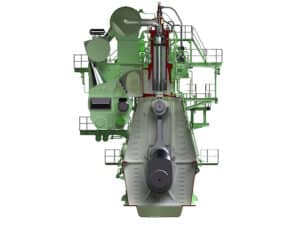
Op-Ed: How a sludge problem becomes a decarbonization solution
Written by
Nicholas Ball, CEO, XFuel
By Nicholas Ball, CEO, XFuel
With only 15 years to eliminate the majority of its greenhouse gas (GHG) emissions, the shipping industry is facing a challenge to deliver decarbonization at an affordable cost. Nicholas Ball, XFuel’s CEO, believes that circular economics is the key for shipowners now that new fuel-from-waste technology exists to make the seemingly unattainable option of a scalable, drop-in and low-carbon fuel at a competitive price a reality.
MARPOL Annex 1 sludge, long considered an acute waste problem for the shipping industry, could now be transformed into an opportunity for many shipowners as they navigate the costs, choices and challenges on the route to net-zero emissions.
Proving that circularity can be at the heart of decarbonization solutions and the protection of our ecosystems, new potential to process a vessel’s own waste into low-carbon Marine Gas Oil (MGO) reinforces the critical contribution of recycled carbon fuels (RCFs) to a cost-competitive energy transition.
The development of novel fuel-from-waste technology presents vessel owners with the option to realize low-carbon fuel supply at a cost that is competitive with traditional fuels. This is a tantalizing prospect for operators seeking a strategy that can be implemented without delay and without retrofits or infrastructure changes. It comes against the backdrop of FuelEU Maritime’s imposed fines for high-emission journeys, along with the energy efficiency and route optimization requirements of the forthcoming International Maritime Organization (IMO) MEPC 83 framework.
By eliminating waste management costs, the ability to convert sludge into a scalable, drop-in, low-carbon fuel at a competitive price lowers the whole-life costs of fuel supply. This demonstrates that the circular economy for low-carbon fuels no longer needs to be assumed as high-cost and hard to implement.
A new fuel source to deliver low-cost carbon compliance
A regulated waste stream that every ship has to manage, MARPOL Annex 1 sludge consists of non-recyclable waste oils produced during normal shipping operations by lubrication, oil filters, drip trays and fuel purification processes.
With approximately 10 million tons of sludge offloaded in ports each year as vessels dispose of waste oil residue, the disposal of sludge is an expensive and time-consuming process. Often the sludge is unsuitable for re-use, and in most cases it is incinerated on-board with no benefit to the vessel. In the United States, operators can pay for disposal, or, in some less regulated states, waste may be stored in open ‘lakes’ with the possibility of contamination and negative impact on wildlife. Another problem is illegal discharge, with thousands of illicit dumping incidents per year.
Therefore, the option to transform sludge, along with other waste feedstocks, into RCFs stands out as both an environmental choice and an economically sound compliance strategy, meeting European Union and IMO regulations to rapidly advance the use of low-carbon fuels in the shipping industry.
Recognized by the EU as part of its Renewable Energy Directive II regulation, RCFs allow for the use of non-renewable waste streams in transport fuels that count towards decarbonization targets with a minimum GHG saving of 70% compared to the RED II fossil reference.
They can contribute to reducing GHG by extending the lifecycle of carbon in waste fossil sources and substituting for traditional fossil fuels, as well as avoiding incineration or disposal that results in GHG emissions.
A technology breakthrough to complete the circle
Transforming feedstocks into ISO-compatible fuels proven to reduce emissions using a modular and decentralized technology is a challenge. In fact, to date, it has been difficult to make the economics of low-carbon fuels work.
New technologies with lower capital expenditure than traditional hydro-processing approaches are needed to help drive forward decarbonization at an affordable cost. The high price of low carbon alternative fuels is disrupting the energy transition for many vessel operators and a viable alternative is urgently needed.
XFuel’s Chemical Liquid Refining technology (CLR – ‘CLEAR’) is one such alternative. Producing a fuel that is price-comparable to fossil fuel, CLR can refine marine sludge and other waste hydrocarbons into a direct replacement (drop-in) low-carbon MGO which is ISO 8217 DMA compliant and compatible with existing engines and infrastructure.
CLR uses a cost-efficient unique cracking technology to shorten the hydrocarbon chains, producing a higher quality product from the waste oils than distillation alone. A single fuel production facility, ideally strategically located near ports to minimize supply chain environmental impact and reduce operating costs, can produce 14,000 tons of refined MGO annually from 16,000 tons of dewatered sludge. With a decentralized network of refining facilities in place worldwide, vessels could conveniently bunker low-carbon MGO.
Validated to achieve up to 85% GHG savings, the low-carbon drop-in MGO produced by XFuel’s CLR technology, can be blended with traditional MGO and is compatible with FuelEU Maritime, plus it can be produced at a price per ton that is competitive with MGO reference prices.
Bridging the gap on long path to net zero
Ambitious decarbonization targets are putting pressure on the maritime sector to explore all viable pathways to reduce GHG emissions, as shipowners search for reliable and cost-accessible long-term solutions.
With upwards of 95% of the global fleet still conventionally fueled, competition for drop-in fuels that reduce the carbon intensity of traditional fuel oil will drive prices up – yet key questions surround the timescale and availability of alternative low-carbon fuels.
Working with a recycled carbon fuels producer to refine MARPOL Annex 1 sludge is now a realistic option for shipowners, enabling them to lower their cost of disposal, secure low-cost green fuels, and reduce their carbon emissions to comply with regulations and avoid penalties imposed on high carbon emitters.




